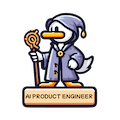🚀 Welcome to QuackChat: AI's Quantum Leap is Here!
Hello, DuckTypers! It's Jens here, your friendly neighborhood software architect, back with another episode of QuackChat. Last time, we talked about Nova's impressive language models and OpenAI's revolutionary APIs. But hold onto your keyboards, because today we're diving into even more groundbreaking AI advancements that are reshaping our digital world!
🖌️ OpenAI's Canvas: The Future of Collaborative AI

Let's kick things off with a game-changer in the world of AI interfaces. OpenAI has just unveiled Canvas, a new feature that's set to revolutionize how we collaborate with AI on writing and coding projects.
What Makes Canvas Special?
- In-line Feedback: Imagine getting real-time suggestions as you type, just like having a super-smart co-pilot.
- Targeted Editing: No more scrolling through endless text. Canvas lets you zero in on specific sections for AI assistance.
- Enhanced Research: It's like having a research assistant that can pull up relevant information in a snap.
Now, I know what you're thinking: "Jens, this sounds great, but how does it actually work?" Well, let me break it down with some pseudo-code:
def canvas_collaboration(user_input):
while user_is_typing:
context = analyze_context(user_input)
suggestions = generate_suggestions(context)
display_inline(suggestions)
if user_requests_edit:
section = select_section(user_input)
improved_section = ai_edit(section)
update_canvas(improved_section)This simplified code snippet shows how Canvas might continuously analyze your work, offer suggestions, and help with targeted edits. It's like pair programming, but your partner is an AI with access to vast amounts of knowledge!
But here's a question for you, DuckTypers: How do you think tools like Canvas will change the way we approach creative and technical writing? Drop your thoughts in the comments – I'm eager to hear your predictions!
🗣️ Breaking Language Barriers: Real-time AI Communication
Now, let's talk about something that's going to revolutionize how we communicate across languages. Remember when we discussed OpenAI's Realtime API last time? Well, the implications of this technology are far-reaching, especially when it comes to breaking down language barriers.
The Power of Real-time Translation
Imagine having a conversation with someone who speaks a language you don't understand, and an AI translates in real-time, maintaining the natural flow of conversation. It's not science fiction anymore – it's becoming a reality!
Here's a quick look at how this might work:
def realtime_translation(speaker_1, speaker_2):
while conversation_active:
audio_1 = capture_audio(speaker_1)
text_1 = speech_to_text(audio_1)
translated_text_1 = translate(text_1, speaker_2.language)
audio_response_1 = text_to_speech(translated_text_1)
play_audio(audio_response_1, speaker_2)
# Same process for speaker_2
...This technology has the potential to transform international business, education, and personal relationships. But it also raises some interesting questions. For instance, how might real-time translation impact the way we learn languages or experience different cultures? Share your thoughts in the comments!
💻 The Evolution of AI Coding Assistance
As a software architect, I'm particularly excited about the advancements in AI coding assistance. We've come a long way from simple autocomplete functions to AI that can understand context, suggest entire code blocks, and even explain complex algorithms.
The Rise of AI Pair Programming
Tools like GitHub Copilot and the newly improved GPT-4 are changing the game for developers. They're not just autocompleting lines of code; they're understanding the bigger picture of what you're trying to achieve.
Let's look at a simple example of how an AI coding assistant might help you implement a sorting algorithm:
# User types: "implement quicksort"
# AI suggests:
def quicksort(arr):
if len(arr) <= 1:
return arr
pivot = arr[len(arr) // 2]
left = [x for x in arr if x < pivot]
middle = [x for x in arr if x == pivot]
right = [x for x in arr if x > pivot]
return quicksort(left) + middle + quicksort(right)
# AI explains: "This implementation uses the divide-and-conquer strategy..."
The AI not only provides the code but can also explain the logic behind it, helping developers learn and improve their skills.
But here's a question to ponder: How do you think AI coding assistance will impact the job market for developers? Will it make coding more accessible to beginners, or will it raise the bar for what's expected of professional developers? Share your thoughts!
🚀 Emerging AI Tools: Shaping the Future
Before we wrap up, let's take a quick look at some other exciting AI tools that are emerging:
1. Crawl4AI

An open-source, LLM-friendly web crawler that's revolutionizing data collection for AI projects.
2. Not Diamond model router

A tool that efficiently connects various models for tailored tasks, potentially changing how we build AI pipelines. We talk about it in one of your AI Product Engineer Show episodes. Don't forget to check it out!
3. OpenHands resolver

An exciting project aiming to automatically resolve issues in GitHub repositories.
These tools are just the tip of the iceberg, DuckTypers. They represent a shift towards more accessible, efficient, and powerful AI development ecosystems.
Now, I'm curious: Which of these tools excites you the most, and why? How do you see them impacting your work or studies? Let me know in the comments!
🎓 Wrapping Up: Embracing the AI Revolution
Alright, DuckTypers, we've covered a lot of ground today. From OpenAI's Canvas reshaping collaborative interfaces to real-time translation breaking down language barriers, and from the evolution of AI coding assistance to emerging tools shaping the future of AI development.
As an engineer new to the AI space, I'm constantly amazed by the rapid pace of innovation. But remember, with great power comes great responsibility. As we embrace these technological advancements, we must also consider their ethical implications and ensure that AI benefits humanity as a whole.
So, here's your homework (and trust me, it's more exciting than any homework I've ever given!):
- Explore one of the tools or concepts we discussed today.
- Think about how it could be applied in your field of work or study.
- Share your insights and ideas in the comments below.
Let's keep the conversation going and shape the future of AI together!
Until next time, this is Jens signing off. Keep coding, keep exploring, and keep pushing the boundaries of what's possible with AI!


